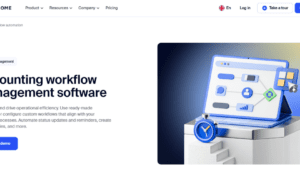Introduction:
Financial and accounting audits play a crucial role in ensuring the integrity of financial statements and compliance with regulatory standards. In recent years, automation has been revolutionizing the audit process, driving increased efficiency, accuracy, and insights. This article explores the rising automation trends in financial and accounting audits, with a specific focus on the transformative technologies of AP automation and invoice processing. By leveraging automation, organizations can enhance audit quality, streamline workflows, and leverage valuable data-driven insights.
1. AP Automation: Transforming Audit Efficiency
Accounts Payable (AP) automation is reshaping the audit process by streamlining the review and verification of financial transactions. Traditionally, auditors faced challenges in manually examining a large volume of invoices, validating data accuracy, and identifying irregularities. However, with AP automation, auditors can leverage technologies such as optical character recognition (OCR) and data analytics to automate invoice processing, detect anomalies, and identify potential risks. According to a study by Deloitte, organizations can achieve up to a 90% reduction in audit effort by adopting AP automation solutions.
2. Invoice Processing Automation: Enhancing Audit Accuracy
The automation of invoice processing is revolutionizing how auditors validate financial data and ensure accuracy. By utilizing intelligent document processing technologies, auditors can automatically extract data from invoices, match them with purchase orders and contracts, and perform error checks. This automation significantly reduces the risk of manual errors, improves data accuracy, and expedites the audit process. According to a study conducted by PwC, organizations that implemented invoice processing automation experienced a 65% reduction in data entry errors and improved overall audit quality.
3. Data Analytics and Audit Insights
The integration of data analytics into the audit process has become a game-changer for auditors, enabling them to leverage large volumes of financial data for valuable insights. AP automation and invoice processing systems generate vast amounts of data, which can be analyzed using advanced analytics tools. By applying data analytics techniques, auditors can identify patterns, anomalies, and trends, facilitating more comprehensive risk assessments and enhancing audit procedures. According to a survey by KPMG, 84% of audit executives believe that data and analytics will fundamentally change how audits are conducted.
4. Continuous Auditing and Monitoring
Automation enables auditors to move away from traditional point-in-time audits toward continuous auditing and monitoring. By leveraging real-time data feeds and automated processes, auditors can conduct ongoing monitoring and risk assessments. This proactive approach allows auditors to identify issues and irregularities in a timely manner, facilitating early intervention and risk mitigation. AP automation and invoice processing systems provide auditors with the necessary tools and data to perform continuous audits, improving overall audit effectiveness and providing stakeholders with up-to-date insights.
5. Enhanced Compliance and Regulatory Adherence
Automation technologies, including AP automation and invoice processing, facilitate compliance with regulatory requirements. These solutions ensure that audit processes adhere to industry standards, such as the Generally Accepted Auditing Standards (GAAS), International Financial Reporting Standards (IFRS), and local regulatory frameworks. Automated systems provide robust audit trails, data encryption, access controls, and secure storage, ensuring data integrity and confidentiality. Organizations that embrace automation in audits can effectively demonstrate compliance, mitigate regulatory risks, and bolster stakeholder trust.
6. Future Opportunities: Artificial Intelligence and Machine Learning
As automation continues to evolve, the incorporation of artificial intelligence (AI) and machine learning (ML) holds immense potential for the future of financial and accounting audits. AI and ML algorithms can analyze vast amounts of financial data, identify patterns, anomalies, and outliers, and provide auditors with valuable insights for risk assessment and fraud detection. These technologies can enhance the efficiency and effectiveness of audit procedures, leading to more robust financial reporting and heightened audit quality.
Conclusion:
The rising automation trends in financial and accounting audits, driven by technologies such as AP automation and invoice processing, are revolutionizing the audit landscape. By embracing automation, organizations can optimize efficiency, enhance accuracy, and leverage valuable insights from vast amounts of financial data. As automation continues to evolve, auditors must adapt to the changing landscape, embracing advanced technologies like artificial intelligence and machine learning. By doing so, organizations can unlock new possibilities for improving audit quality, ensuring compliance, and delivering trusted financial reporting to stakeholders.



































